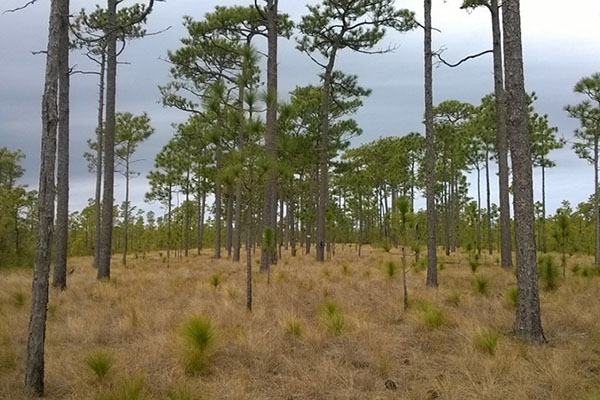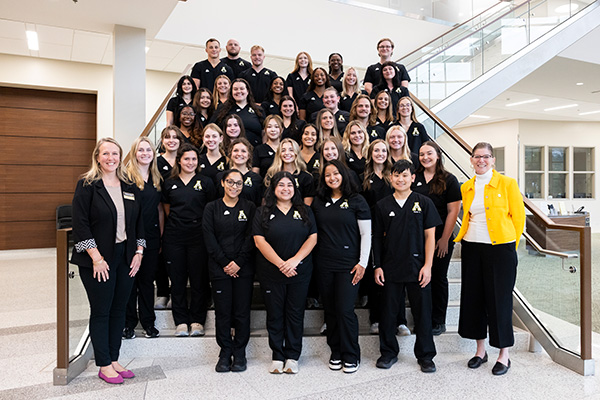BOONE, N.C. — Dr. Peter Soulé’s research, which analyzes rainfall variability in the U.S.’s Southeast Atlantic Coastal Region (SACR) by examining tree ring records of the longleaf pine, will continue thanks to a $36,035 grant from the University of North Carolina at Greensboro, which is the lead institution for the project. The funding is part of a $300,886 grant from the National Science Foundation (NSF).
Soulé, professor in Appalachian State University’s Department of Geography and Planning, is working on the project alongside partners Dr. Paul Knapp, professor in the Department of Geography at UNC Greensboro, and Dr. Justin Maxwell, assistant professor in the Department of Geography at Indiana University Bloomington.
Soulé said the team’s initial sampling for the project took place in 2013, and the team’s pilot study results were published in the March 2016 issue of the journal Climate Change.
“In the pilot study, we reported a strong relationship between latewood growth rates of longleaf pine (Pinus palustris) and precipitation delivered by tropical cyclones (TCP) at two sites,” Soulé said.
“We validated this relationship and used the proxy tree ring record to reconstruct TCP back to A.D. 1836.”
Soulé reported that he and his team have collected tree ring samples from eight study sites in the North and South Carolina coastal plains and will collect samples from two additional sites in 2018.
He explained the primary goals of the research are to “extend the TCP record to the 1700s to document spatio-temporal variability prior to historic records, and examine variability of TCP and determine the sensitivity of TCP to the North Atlantic, Atlantic Multidecadal and El Niño-Southern oscillations.”
According to Soulé, he and his colleagues have extended the climate reconstruction to A.D. 1780 and are “finding similar climate sensitivity to radial growth throughout the North and South Carolina coastal plains in addition to similar length of the longleaf pine tree ring record.
“We have identified a multidecadal period of minimum TCP in the 1800s, with implications that current water management plans in the coastal plain are only based on precipitation recorded during the instrumental period (circa 1950),” he said.
Evan Montpellier ’17 ’18, a two-time graduate of Appalachian’s geography program from Greensboro, is a research assistant for the project. Additionally, April Kaiser ’16, a Raleigh native and first-year graduate student in Appalachian’s geography program; Brianna Hibner, a freshman environmental science major from West Lebanon, New Hampshire; and Julia Adams, a junior geography major from Canton, Ohio, are all involved in the project.
About the Department of Geography and Planning
The Department of Geography and Planning promotes the understanding of the spatial dimensions of human behavior within the physical and cultural systems of the earth, and the role of planning in achieving improvement in those systems. The department offers degrees in geography and in community and regional planning. Learn more at https://geo.appstate.edu.
About the College of Arts and Sciences
The College of Arts and Sciences (CAS) at Appalachian State University is home to 17 academic departments, two centers and one residential college. These units span the humanities and the social, mathematical and natural sciences. CAS aims to develop a distinctive identity built upon our university's strengths, traditions and locations. The college’s values lie not only in service to the university and local community, but through inspiring, training, educating and sustaining the development of its students as global citizens. More than 6,800 student majors are enrolled in the college. As the college is also largely responsible for implementing App State’s general education curriculum, it is heavily involved in the education of all students at the university, including those pursuing majors in other colleges. Learn more at https://cas.appstate.edu.
About Appalachian State University
As a premier public institution, Appalachian State University prepares students to lead purposeful lives. App State is one of 17 campuses in the University of North Carolina System, with a national reputation for innovative teaching and opening access to a high-quality, cost-effective education. The university enrolls more than 21,000 students, has a low student-to-faculty ratio and offers more than 150 undergraduate and 80 graduate majors at its Boone and Hickory campuses and through App State Online. Learn more at https://www.appstate.edu.
What do you think?
Share your feedback on this story.












